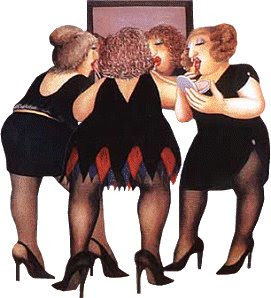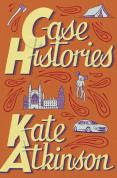 Like the grand fireplace that's really the hidden entrance to a secret tunnel in an old fashioned mystery thriller, one can stumble into being a stereotype without being consciously aware.
Like the grand fireplace that's really the hidden entrance to a secret tunnel in an old fashioned mystery thriller, one can stumble into being a stereotype without being consciously aware. Unlike the dashing leading man and his beautiful accomplice, real life does not call cut on the scene nor allow the opportunity of discarding our make-believe costumes. We wear our imprinted outfits from one day to the next, acquiring accessories as we go but never usually stopping to slough our skins or remove our stage make up. The personal looking glass only ever reflects what we wish to see; the real mirror is through the eyes of others.
It is probably true that to some extent the conformity to a stereotype is a necessary attribute of functioning within a collective society. No man is an island so the old saying goes, and even those who choose consciously not to conform with conventional mores conform nonetheless with the stereotype of non-conformists of one sort or another. The conventions that we adopt - from the clothes we wear and the books we read to the pastimes we enjoy and the shops we spend our money in - are a product of both our conscious choices and our unconscious drives. And in the selection of these things and habits and actions we find, somehow, our identity.
But what happens to us when we are forced to change, either through circumstance or a fundamental shift in our personal belief system? It is perhaps at that point that we realise that the things about ourselves which we thought to be unmovable bedrocks are nothing of the kind. Our psyches, if we let them, are fluid and malleable things; we encounter difficulty, anger and challenge only when we are still resisting the change. If tens of thousands of years of human evolution has shown us one thing it is that we are extremely adaptable beings. And this applies both at a personal and societal level.
I've been thinking about this a lot recently, particularly about to what extent individuals recognise the range of stereotypes to which they conform. It's also probably fair to say that there are various kinds of stereotyping at work simultaneously: the stereotype which society projects onto a person related to his or her 'visible' attributes - gender, age, manner - for instance; the stereotypes that an individual subscribes to him- or herself - belief systems, ways of behaving, relationships with others, and so on.
It's always intriguing when you have that rare opportunity to find out what others assume about you and can compare that with what you think about yourself. There is often a very large gap indeed between the two, sometimes amusingly so. But neither view is really wrong or right as such - both are valid perceptions, even if we might justifiably place more weight with our own interpretation of ourselves than that of another.
But then isn't that the basis of all great drama? What would be the point of a mystery thriller if there was no tension between what the hero believes about himself and what we can see with our eyes? And even the worst of stereotypical film baddies must have something we can relate to if we are to believe in him. With or without a costume.
The picture is a painting by the wonderful late Beryl Cook
PS - Entirely unconnected, but this cheered me up no end: http://www.guardian.co.uk/politics/2009/jun/09/nick-griffin-bnp-pelted-eggs




Another falls prey to the lure of perception.
ReplyDeleteJust keep your eyes open, Katy, for the chameleons among us.
Is a chameleon stereotypical?
Hee hee hee, Fram, I think there may be quite a few chameleons among us.
ReplyDeleteSkillful creatures those. Is it not true that they can not only change colour to blend in with their surroundings but also grow back their tails should they be so unfortunate as to lose them?
Hi Katy. Thank you for this very thought provoking post. I love the title and the picture too...just perfect.
ReplyDeleteYou say, "The personal looking glass only ever reflects what we wish to see; the real mirror is through the eyes of others." Although very true that we often only see what we want to see about ourselves, I believe it to be an extremely sad state of affairs if we are to believe that the eyes of others know us better than our own. We can be influenced by others, but the real key to living our best, most mature and fulfilling life is in learning to really know ourselves, what is right for us, what makes us tick, and yes, take off those rose-colored glasses when looking in the mirror so we can learn, understand our flaws and become better people, changing where necessary.
I have had the experience of looking at a person and judging who they are, what they are about, and only after really getting to know them discovered they were completely different than what I originally thought. My mirror was clearly wrong. If this man had looked in my mirror of judgment he would have run home and hid under the bed. Thank goodness he wasn't looking to others to form an impression of himself. And sometimes, too, we need to put on those rose-colored glasses when looking at ourselves because being a loving person starts, I believe, with truly being kind to and loving ourselves.
Thanks for giving me much to think about today! I love the way you express yourself. I think I shall call you Master Katy, Queen of the Written Word...LOL
Have a Happy Day!
Thank you for your kind words, Kelly, and your equally thought-provoking comment.
ReplyDeleteI think you're absolutely right in saying that we need to put on our rose-tinted specs to look at ourselves from time to time. It's very easy, isn't it, to see only the flaws and wrinkles (real or metaphorical) and not the good parts too.
Like you, I have had a few occasions when my initial perception of someone has changed considerably after I've got to know them. I wonder, just pondering this now, why that happens? Is it because we've simply been wrong in our initial judgement? Or is it perhaps that, in their growing confidence of knowing us, the other person has 'allowed' us to see more of the real them? A warning in any case to be less 'snappy' in our decisions sometimes, anyway.
It's also been, personally speaking here, a challenge to revise my evaluation of someone I thought I knew well in the opposite (by which I mean less favourable) direction. That I have perhaps found even harder.
You've given me lots of food for thought here too - thank you! I'll come back to this another day when I've had time to reflect.
You have a great day too, kelly, and thank you as always for dropping by :-)